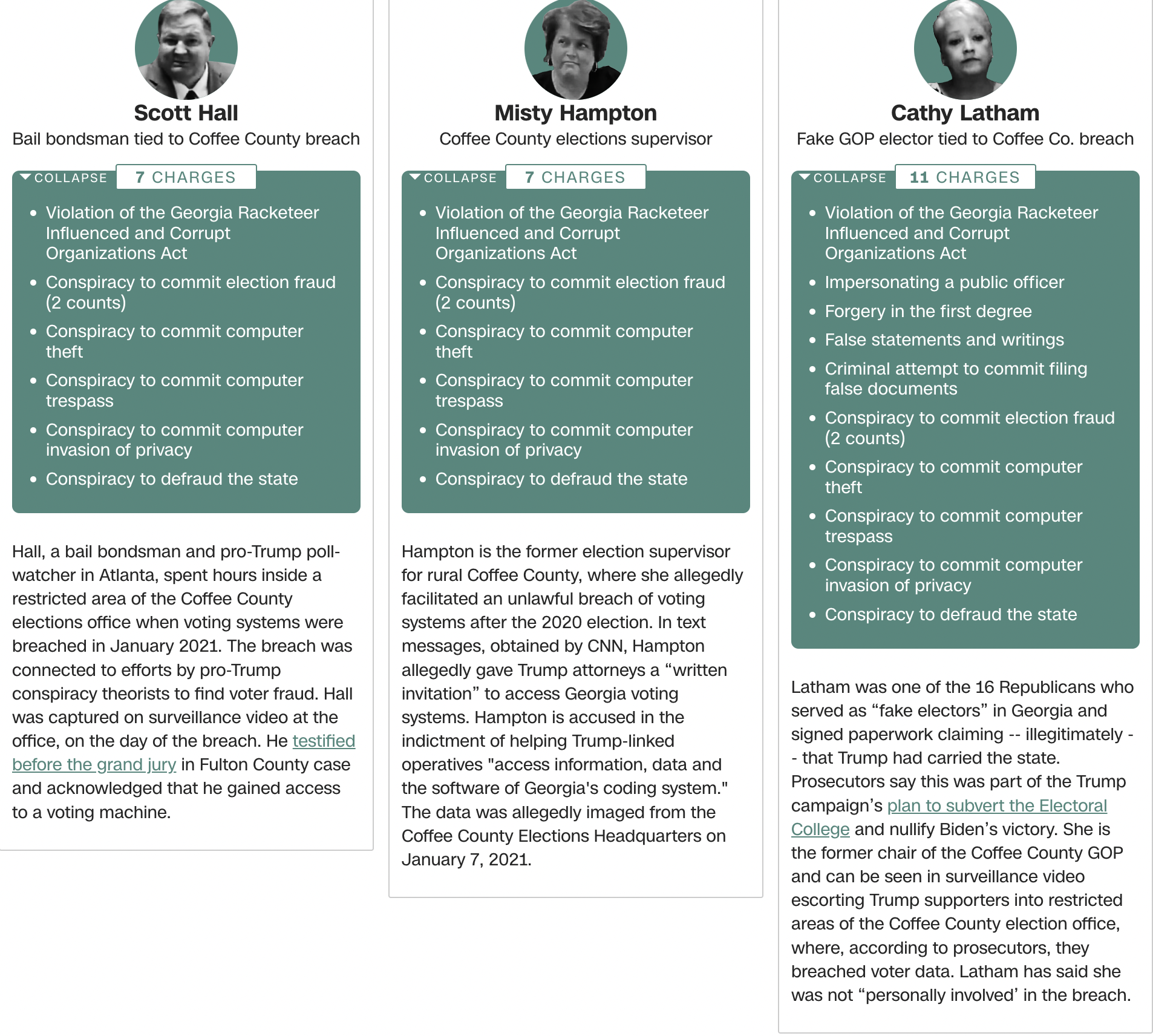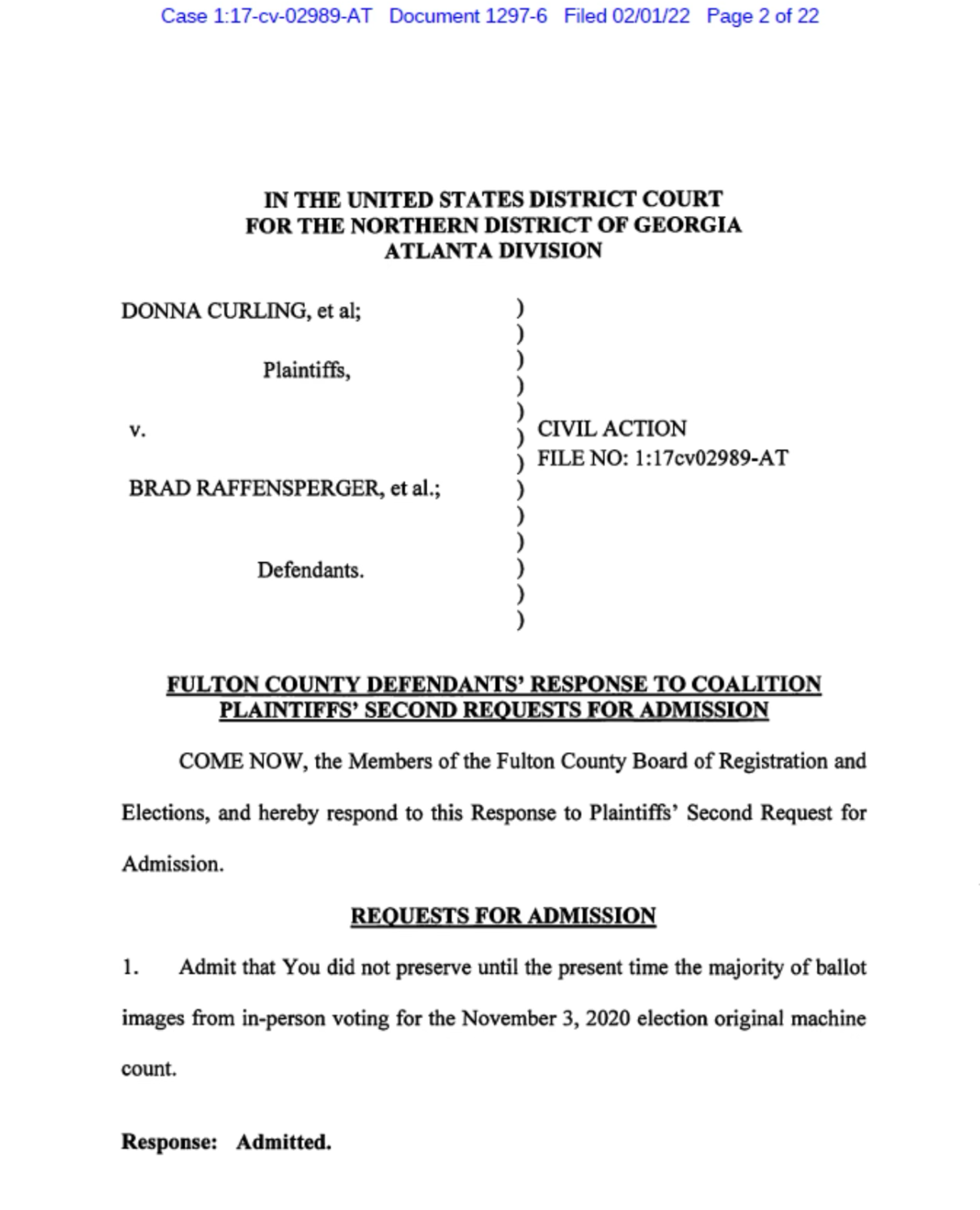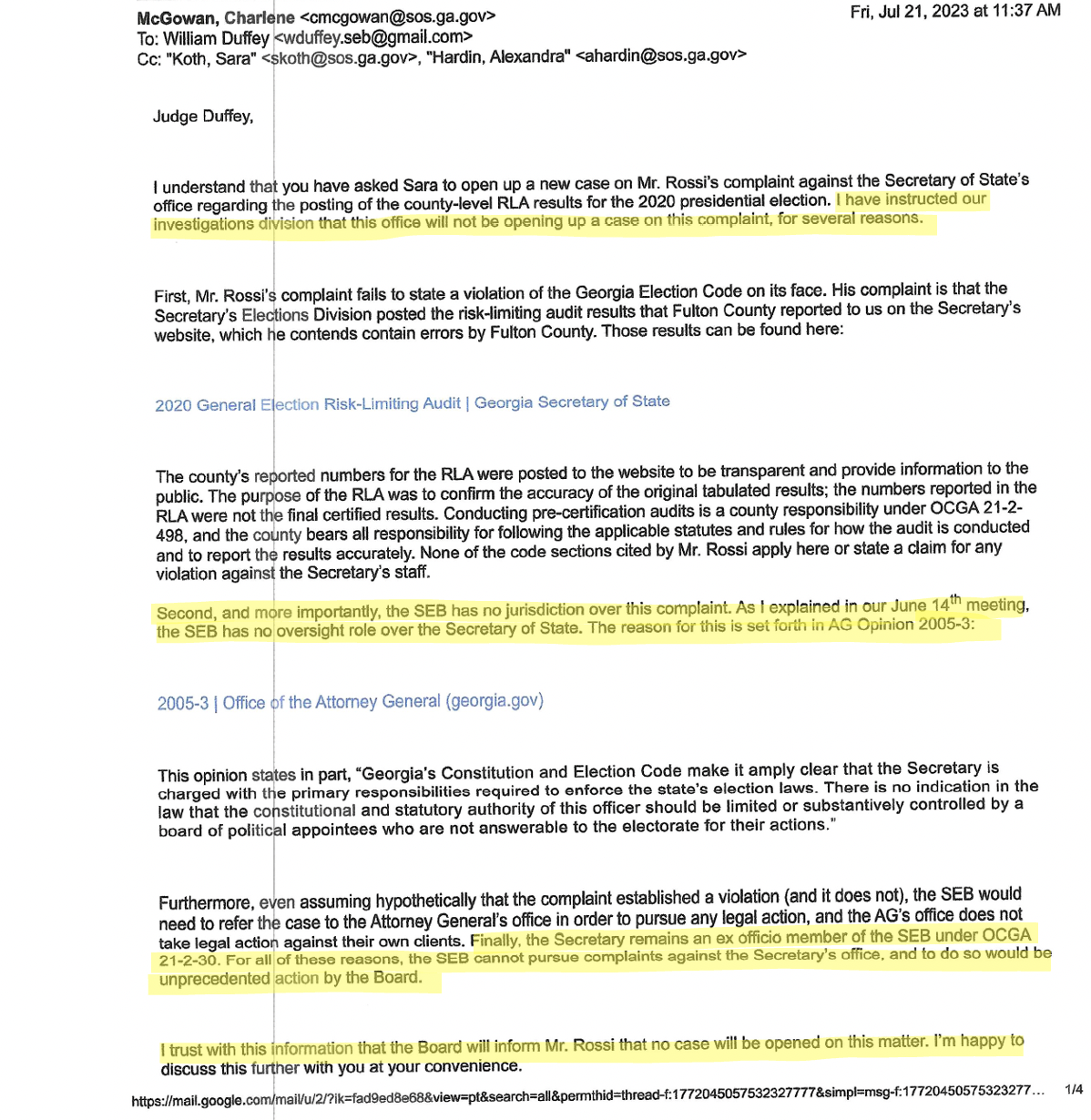Governor Kemp and Secretary of State (SOS) Raffensperger want Georgia voters to move on from the 2020 election. Correspondence and official decisions made over the summer indicate the State Election Board (SEB) wishes the same. While this may work for politicians and government officials, President Trump and 18 others, including Georgia voters, are under indictment for the 2020 election. CNN reported that all are being charged with serious crimes that, if not disproven, could alter the course of their lives.
Some believe it is a witchhunt prompted by bitter disdain for the former President. In any case, the charges make it exceedingly difficult for the indicted to leave 2020 behind unless they can prove the election resulted in anomalies and errors that should have rendered its certification a certifiable sham.
Several of the indicted were longstanding and earnest election officials who witnessed problems with tabulators and other election-related snafus. When they investigated, they were doing their jobs. However, it's not the way their actions are being portrayed. They are being treated like criminals, punished for questioning and attempting to legally remedy election errors that didn't seem right at the time.
 Coffee County/CNN
Coffee County/CNN
In addition to the great work of groups like VoterGA, True The Vote, and others, three citizens, Kevin Moncla, Joseph Rossi, and David Cross, have worked tirelessly to investigate the 2020 Presidential Election. Evidence shown in two complaints, one from Rossi in September 2021 and the other from Moncla and Rossi in July 2022, would easily validate Trump's request for an investigation into the election, proving he was correct to request an investigation of the 2020 election during the Jan. 2, 2021, one-hour conference call with SOS Raffensperger. The various investigations and complaints documenting anomalies or outright errors affected roughly 50,000 votes, exceeding the narrow margin in the Presidential election of 11,779 votes.
During their investigation of Fulton County's election, Moncla and Rossi have written countless FOIAs and letters. They have poured doggedly over tabulator tapes, ballot images, system logs, and batch tally sheets to document the irregularities in the election. Their collective work shows undeniable proof of missing ballots and missing ballot images, meaningful gaps in the chain of custody, and myriad other anomalies and errors that failed to comport with state laws.
However, two years later, with few exceptions, there has been no remedy but rather a series of delays, blocks, and at times, by officials. Others have derided their findings, saying they are Trump-loving election denies. Raffensperger's office should have undertaken their investigatory work, not two uncompensated citizens. What's worse is that Raffensperger continues to misrepresent the phone call with Trump. And he continues to tell Georgia voters that Biden won, as shown by his audit and his recount.
Prior reporting from UncoverDC, here and here, goes into great detail about the Rossi/Moncla findings. However, much has happened since, and some of it bears repeating.
No ballot images were reviewed for in-person voting for the election because they were destroyed on Dec. 2. The ONLY ballot images available after the election were those representing absentee ballots. Of the 5 million or so votes cast in the 2020 election, "counties failed to preserve 1.7 million ballot images," according to Moncla. "They reused flash cards with the images on them without uploading and securing the images first." In addition, there was never a reconciliation of paper ballots with ballot images.
 Missing Ballot Images/Curling v. Raffensperger
Missing Ballot Images/Curling v. Raffensperger
For the original November 3rd count, according to Moncla:
"There were no records to substantiate the results. There were no ballot images for any in-person voting. There were no tabulator tapes for 20,000 early voting ballots. The remainder of the in-person voting tabulator tapes were all unsigned and uncertified, as required by law. To be exact, voting tabulator tapes representing approximately 295,000 ballots were all unsigned and uncertified.
Then, on Nov. 14, 2020, Raffensperger's office conducted a hand count audit of all physical ballots but took no measures to reconcile or compare them with another metric—such as ballot images. "Without a metric of comparison or reconciliation, there is no way to determine what 'all' was," Moncla told UncoverDC. The process used was not exactly trustworthy either. The ballots were sorted by candidate with totals written on batch tally sheets, one for each batch. Those totals were entered into a software program called ARLO, which is centrally managed. In turn, the counties received their totals from ARLO. Can voters trust the results when they are counted in this way?
The third count was machines that conducted the Presidential recount on Dec. 2, 2020. Per Moncla's Case No. SEB-2023-025 referenced in a Jul. 8, 2022 letter, there were irregularities in the recount that led to the dubious addition of 16,382 votes to the "Batches Loaded Report" (BLR) of Dec. 3, 2020, and then to the certified result on Dec. 4, 2020. The certified result also included 3,125 duplicate ballots and 17,852 votes of "unknown providence," according to the official complaint. But not to worry, Raffensperger said his recount "showed no substantial changes."
Per conversations with Moncla, "Election night showed 528,777 votes, but the physical ballots in the recount numbered 511, 543." In addition, "by the time of certification on Dec. 4, 2020, Fulton County claimed to have found 16,382 votes." Magically, that is "nearly all of the shortfall." Additional tabulator results "from unidentifiable and unreported tabulators" accounted for 20,173 votes in the Nov. 3, 2020 vote totals.
The Dec. 2, 2020 recount failed to reconcile with vote totals from Election Night, nor could it, according to Moncla. Votes were "simply added out of thin air" to make up the difference revealing there is "no paper documentation of ballots for nearly 42,000 votes."
According to Moncla, "At the end of the early voting, the security seals were broken and memory cards removed from all early voting tabulators. When the polls closed on Election Day, the memory cards were inserted into surrogate machines, and fraudulent poll closing tapes were printed. The poll tapes for approximately 300,000 ballots were never signed, witnessed, or certified as required by Georgia law."
Based on Moncla's investigation, "The uncertified, false, and fraudulent record of 313,885 ballots renders the Fulton County certification of the 2020 General Election results "void ab initio." These deficiencies and other anomalies are well documented in the complaint. And yet, Raffensperger certified it, declaring it was a "tremendous success."
American elections are set up for precinct voting for a reason. It is a smaller universe of interaction and data. For example, tracking and counting voters who sign in is much easier, especially when there is a physical voter sign-in poll book. Tabulator tapes can be compared to physical ballots and then reconciled with the number of voters who signed in. Precincts that reconcile ballots to actual registered voters make the chain of custody much more robust. You know who can vote, who voted, how many voted, and how many ballots you have at that location at the end of the day. There is a "public comparison of aggregated totals with component parts (like ballots, tabulator tapes) and a "publication of precinct detail along with total tabulation. There is a confident and documented point of reference for later counting at a central location or even future recounts.
As in many states, the proper chain of custody for the Georgia election was almost non-existent. Instead, election officials rely almost exclusively on machines or Black Box voting. Electronic poll pads are used, and the data is transmitted digitally to other locations. Ballots are counted at "Central" with no history of reconciliation against any other metric than their own. Machines count, tabulate, and handle most of the process; it is all invisible and unverifiable to the voter. Whether you think machines should be used or not, the lack of transparency has destroyed our trust in the outcomes of elections.
The Rossi Hand Count
It is important to note that Rossi only looked at absentee ballots because they were the only ballots with images. He wanted to be able to do a proper reconciliation, unlike Raffensperger & Co.
The Rossi Hand Count complaint (SEB 2021-181), filed more than two years ago, "proved the hand count was a lie," according to a column submitted to the Georgia Record dated Aug. 7, 2023. The author of the column asks a very good question. The Secretary of State had the data to show that the votes were unreconcilable in November 2020. So, the author asks, "Why would a Republican Secretary of State deny a Republican Presidential candidate a chance to investigate irregularities in an improper count of his election?"
The Rossi complaint documented 36 errors during the hand count in Fulton County alone, errors that were verified by Governor Kemp himself, with over 4,000 votes for Biden that did not exist.
The author for the Georgia Record writes that Rossi "documented 36 errors in the absentee ballot hand count in Fulton County alone that showed that Joe Biden had been improperly assigned 4,081 votes in the 2020 election—a 2.8% error rate in that subset of the vote. Statewide, that would translate to a margin of error of 150,000 in a state where the margin of victory was less than 12,000."
The Governor was so convinced errors were made that he referred Rossi's work to the State Election Board in November 2021. Kemp's report confirming the inconsistencies found by Rossi can be found here.
 Kemp Orders Investigation
Kemp Orders Investigation

 Kemp Referral Nov. 17, 2021
Kemp Referral Nov. 17, 2021
After Kemp's referral to the SEB and despite great persistence from Rossi, there were countless delays. The SEB assigned a case file in December 2021. But between December 2021 and a SEB meeting on Mar. 16, 2022, there was a long, drawn-out investigation by an investigator with the Secretary of State's office named Vincent Zagorin.
During the Mar. 16 meeting, according to Moncla:
"Rossi presented his information to the board because it was on the agenda to resolve the case. Rossi mentioned the Secretary of State as one who should share responsibility with Fulton County over the errors. But Rossi was called out of order by the acting chair, Matthew Mashburn. Mashburn said Raffensperger was not a respondent to the case. The board, however, voted to send the case to the Attorney General."
 Mar. 16
Mar. 16
Between March 2022 and June 2023, the investigation allegedly continued. The entire duration of the investigation, however, the AG and SOS blamed everything on Fulton County, accepting no responsibility whatsoever for the false hand count results. Then, out of the blue came a secret consent agreement that would shut down the investigation for good.
Prior to the Jun. 8, 2023, meeting of the SEB, a consent agreement between the Attorney General and Fulton County was negotiated behind the scenes. The consent agreement was allegedly orchestrated for a vote to adopt by the Board at the Jun. 8 meeting. However, no one other than Chairman Duffey had even read the thing. Nevertheless, three of the four board members voted to adopt it sight unseen.
On Aug. 1, Moncla responded to the consent agreement issue with his own letter lambasting the SEB and the SOS for failing to follow through or properly recognize the "time and resources [citizens have invested] to investigate, meticulously document and file official, evidence-based complaints which detail very serious failures of Georgia's election system. You have repeatedly failed to acknowledge, investigate, or address the substance of our complaints. Because you have failed, we have failed."
Undaunted, Rossi filed a second complaint between March and June, specifically naming the Secretary of State as a respondent. The SEB Chair, Judge William Duffey, referred the case to the Secretary of State's office to open an investigation.
Charlene McGowan, the General Counsel in the Secretary of State's office, wrote an email telling Duffey and the Board to take a hike. First, she writes, "[T]he SEB has no jurisdiction over this complaint." Then, she asserts the SEB has no oversight over the SOS. Then McGowan explains the Board "would need to refer the case to the Attorney General's office," but the "AG's office does not take legal action against their own clients," referring to Raffensperger. Finally, McGowan states that no one has the authority to investigate the Secretary of State. So then, who does hold the Secretary of State accountable???
"Finally, the Secretary remains an ex officio member of the SEB under OCGA 21-2-30," McGowan continues, "For all of these reasons, the SEB cannot pursue complaints against the Secretary's office, and to do so would be unprecedented action by the Board. I trust with this information that the Board will inform Mr. Rossi that no case will be opened on this matter."
The full email is pictured below:
 McGowan to Duffey
McGowan to Duffey
The Moncla/Rossi complaint is still open. However, Moncla received an email from investigator Zagorin on Sept. 20, requesting he respond by Sept. 22 with extensive additional information, a 48-hour turnaround.
In his Sept. 21 response letter, Moncla explains that most of the information has been supplied to the Governor or SOS since they submitted the complaint more than 14 months ago. He nevertheless gives Zagorin the requested data.
Moncla's Sept. 21 response asks several important questions, including whether he and Rossi will "now be the targets of an investigation," an understandable question given the recent indictments.

 Moncla to Zagorin
Moncla to Zagorin
According to Moncla, Governor Kemp has been professional and responsive to their requests. He has been the only one thus far to acknowledge errors and anomalies and then demand an investigation. However, the fact remains that the person in charge of elections, SOS Raffensperger, has effectively done nothing but pretend his audit, recount, and certification are all "tremendous" and trustworthy.
So, what can be done at this point in time to remedy the 2020 election? Moncla says, at a minimum, Raffensperger should "update the hand count results" to reflect the 6,600 odd votes that don't exist. He continued, "They could issue a fine of $100,000 to the Secretary of State." Or, better yet, "Kemp could pressure Raffensperger to instigate a complete investigation run by a neutral third party" so that voters can be confident future elections will be run and counted fairly and without error or fraud.
None of this should be political. Citizens should be able to challenge or investigate elections without fear of reprisal, being called an "election denier," or being crushed by a financially debilitating lawsuit. Citizens shouldn't pay the price for crimes they didn't commit because of a politicized justice system. Election officials should be eager to investigate when errors occur. Citizens should not have to spend their time and treasure investigating elections that are rightfully the responsibility of elected officials.
"No matter whose side you're on, this stuff is screwed up and unacceptable," says Moncla. "Voters should expect a reasonably, remotely accurate election result. These people's lives are at stake."
*If you would like to contribute to Kevin Moncla's work, you can find his givesendgo here.


